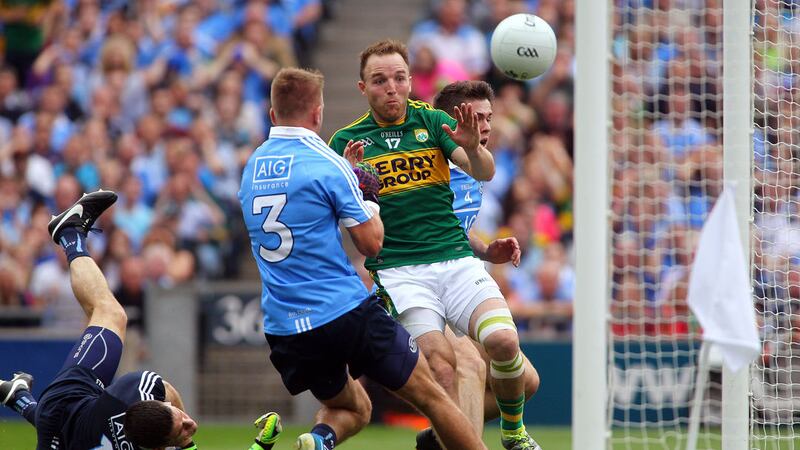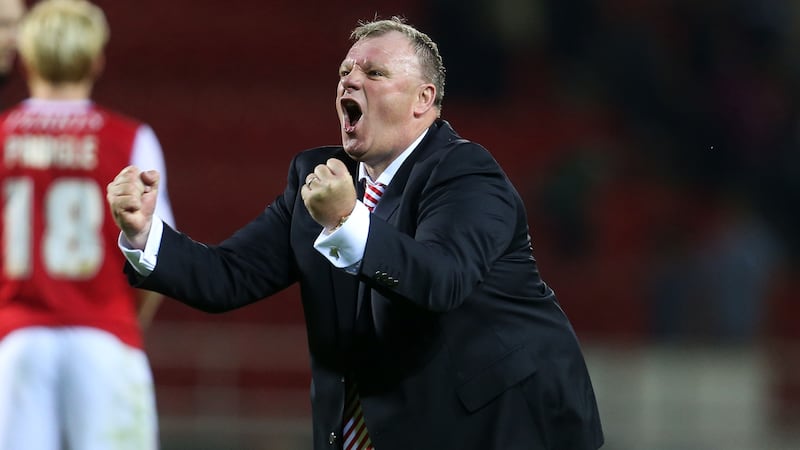IT’S no secret that I enjoy a good sports movie. Usually this type of flick involves the meteoric rise of an underdog who comes from nowhere to become the champion in the most dramatic of circumstances.
Often the movie will have a big motivational speech thrown in there somewhere for good measure. Lots of fist pumping, high fives, chest beating and a few tears as well. If the film is based on a true story then even better.
Coach Carter, Remember the Titans, Any Given Sunday, Rocky, Friday Night Lights and Invictus are the type of shows that have GAA players, managers and supporters salivating at the mouth.
Some of us may end up killing dead things in the empty space of our minds or chewing the plaster from the living room wall – all in the absence of an O’Neills size five even being kicked.
Recently, I came across an inspiring sports movie that is more likely to leave you needing a box of tissues rather than two Valium. Brian’s Song is a tale of how two rivals, both vying for the same position on the Chicago Bears American football team became the first ever inter-racial room mates in the NFL.
Starting out as foes, a serious bromance develops before tragedy strikes one of them down. Throughout Brian Piccolo’s painful journey with cancer, Gale Sayers helps him immensely and their friendship grows deeper and deeper.
Not long before Piccolo’s death at the age of 26 in 1970, Sayers won an award as the NFL’s ‘Most Courageous Player’. In his emotive acceptance , he tells the audience the award should have gone to his buddy Brian.
He told of how his best friend had a “mental attitude that spells out courage 24 hours a day, everyday of his life.” When I looked into the career of Sayers, I came across a quote: “When you step out onto that field you cannot concede a thing.”
The film and that quote got me thinking about courage on the football field – but perhaps not in the way you might think. The biggest blight in Gaelic football has nothing to do with blanket defences, the black card, refereeing standards or even the overuse of the handpass. Short kick-outs aren’t the problem either. It’s the unapologetic concession of them.
The big imponderable in Gaelic football at the minute is: to concede or not concede? It comes down to three options:
1 Concede;
2 Go man-to-man;
3 Try to contest by marking zonally.
Sunday’s game between Mayo and Tyrone was the perfect case-study where both teams seemed rather uninterested in pushing up on each other’s kick-outs to try and gain primary possession. It was painfully frustrating to watch.
The first 60 yards of each restart was like going to a concert and having to endure the warm-up act before your favourite band comes on stage. You roll with it, it’s a bit of a drag, but you would far rather they got straight to the main event.
Nothing memorable happened until each move crossed the halfway line. But before you pass judgement it is important to consider some variables that point to a method in the madness.
If your opponents are playing with a sweeper in the form of a seventh defender, then this has implications for pushing up.
The goalkeeper can often have the ball kicked out within five seconds of the previous move going dead. So, getting that extra man pushed up in time to prevent the short kick isn’t so simple.
Secondly, consideration must be allowed for what happens if you aren’t successful in winning it. You are guaranteed to have more players exposed in your defensive half and as a result much more vulnerable to that attack.
Never mind the short kick-out, in pressing up, the goalkeeper may also see an opportunity to hit the long one – especially if playing with a favourable breeze.
Remember Donegal’s third goal in Jimmy McGuinness’s tactical masterclass against Dublin in 2014? The Dubs in their naivety all pushed up and Paul Durcan cleared 24 outfield players to leave a three versus three situation in the Donegal attack.
By conceding the kick-out, Tyrone guarantee that their opponents will meet their defensive shape in its most effective form each and every time.
Tyrone hit 15 wides on Sunday and Mayo scored 11 times. So, conceding all of these gives Mayo 26 guaranteed attacks.
The Tyrone turnover count would have to be incredibly high for the end to justify the means. The scoring ratio from counter-attacks would also need to read favourably.
But apart from inviting your opponent unchallenged into your half, there is an opportunity being missed.
Few can argue with the sentiment that when you win the opposition kick-out your chance of scoring is pretty high. It is also easier to get early ball to your full-forward line.
There is lots of anecdotal evidence to back that up. In that 2014 semi-final, Donegal only managed to win three of Stephen Cluxton’s 22 kick-outs but in those attacks they scored two goals and a point.
In last year’s All-Ireland semi-final, Kerry pushed up zonally on the Dublin kick-out for a few minutes before half-time and again the outcome was 2-1 from four kick-outs.
It was a risky move but the reward was huge. In last year’s Ulster final, the dynamic of the game changed in Tyrone’s favour when they pushed up on the Donegal kick-out.
Kerry won an All-Ireland by teasing Paul Durcan into making a mistake from a short kick-out.
It seems Tyrone are still struggling with the same part of their game as last year – finishing off chances and kicking early ball into their full-forward line.
Is it all down to poor finishing or in this type of game could some of it be down to the scoring situation they keep finding themselves in?
There is a predictability about Tyrone against the bigger teams that mostly involves conceding the kick-out and playing a running game on the counter-attack. In the mid-Noughties they had this down to a fine art.
But the game has moved on and against the top teams the gaps aren’t the same. Tyrone are a very good team with a very shrewd tactician in Mickey Harte. But they need more variety to their game going forward. Otherwise they will suffer the same fate as 2016.
To make a difference will take change. To change will take courage. To be successful they will need to consider the wise words of Gale Sayers: “When you step onto that field you cannot concede a thing.”







